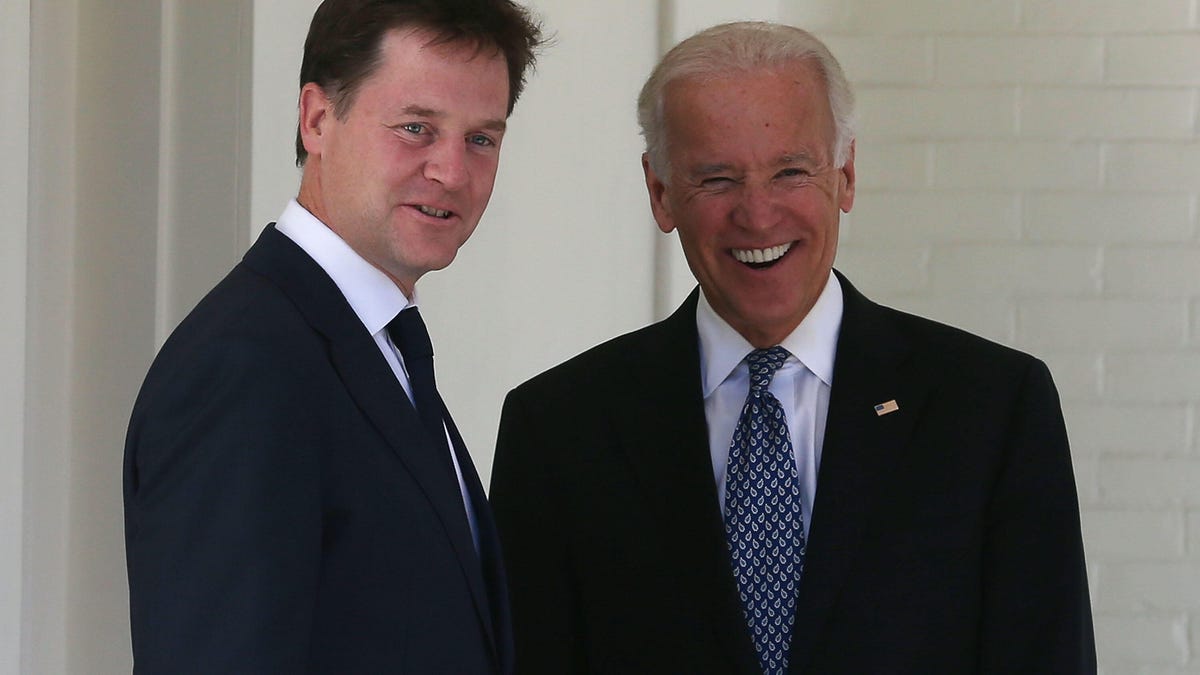Facebook's Nick Clegg: Biden must unite global powers to shape internet amid China threat
At the Web Summit conference, the Facebook policy chief calls on the president-elect to find common ground between the US, Europe and India.

Facebook executive Nick Clegg (left) has an existing working relationship with President-elect Joe Biden.
The biggest strategic tech challenge facing President-elect Joe Biden as he enters office will be uniting major powers including the US, Europe and India to shape the future of the internet so they're capable of facing down threats from China, according to Facebook executive Nick Clegg.
Speaking at Web Summit on Thursday, the social media company's VP for policy and communications said the Chinese internet was "built on a very different set of values" than those of the seamless, open internet that's at the center of Silicon Valley businesses and enjoyed by much of the rest of the world. Clegg expressed his concern that other countries, including Pakistan, Russia, Turkey and Vietnam, are increasingly trying to emulate China's model and create a more insular, censored and heavily surveilled internet.
With two paradigms struggling for supremacy, Clegg said Biden "really needs to work hard, and I would argue urgently, to demonstrate that common ground still exists." If not, he warned, there's a risk the internet may become increasingly splintered and fragmented, with countries spinning off in their own directions.
Reaching a point of unity will really mean working together without getting distracted by policy paralysis happening at home, he said. For the US, it'll mean setting aside its preoccupation with breaking up Big Tech, whereas Europe has been caught up with privacy and data sovereignty issues. India, meanwhile, has its own ongoing debates about security and privacy with regard to messaging service WhatsApp.
"As somebody who obviously worked in politics for 20 years, and worked for many years very closely with Joe Biden himself, I think the thing that I suspect will occur to him and his advisors is that America will be best placed to exert its own influence in this space," he said. Biden's "considerable amount of expertise" when it comes to international diplomacy should play to his advantage, he added.
Clegg's political roots
As Clegg pointed out, he has an existing working relationship with the incoming US president from his time working as the UK's deputy prime minister while Biden served as vice president in the US. As yet, it's unclear what impact this relationship will have throughout the Biden administration, but it'll likely be viewed as a boon within Facebook as the company navigates Washington's attempts to regulate Big Tech.
Clegg already provides Facebook with valuable links to Europe, where he worked both as a bureaucrat and as a member of the European Parliament. His firsthand insight into the EU's complex mechanisms likely serves him well as European officials attempt to regulate the company, clamping down on cross-border data transfers and challenging Facebook over a range of issues, from hate speech to misinformation to political advertising.
Clegg is a noted Europhile ("I remain a passionate European," he said in his Web Summit session), but his opposition to Brexit and belief in the EU doesn't mean he's uncritical of Europe and its policymakers. The focus on regulating tech and privacy in Europe is distracting officials from the fact that they still haven't completed the EU's Digital Single Market project, which would boost Europe's potential to compete commercially in the global tech market rather than just playing a regulatory role, he said.
He also said that in his conversations with policymakers in Europe, as well as elsewhere, he's noticed a "deep-seated, and I think somewhat imprecise, antagonism almost to the idea that data can be held safely at scale in a way to provide ingenious, and in Facebook's case, free tools for people to use." He was worried, he added, that the pendulum had swung too far the other way from the early days of "slightly naive tech euphoria" to blaming every problem the modern world faces on technology.
In a Q&A session following his panel, Clegg addressed his move from politics to Facebook, saying he felt no pressure to appear apolitical in public even though he was representing a company rather than a political party.
"I find it really straightforward to ensure that I do my new job in my new incarnation here in Silicon Valley in a way that is not driven by my own personal politics," he said. In a large company such as Facebook there are always going to be people with a wide range of political views, he added, it's just that his "are more overtly understood."
For better or worse, Clegg said, Facebook is at the center of many ethical, social, cultural and societal debates. "However difficult the debates are, it's always better to get stuck in and solve them," he said. Even though he's left his days in politics behind him, he described it still feeling quite "small 'p' political" to get involved in these policy debates.
The same, he added, was true of working with Facebook CEO Mark Zuckerberg and COO Sheryl Sandberg to "change the company as it adapts to those societal pressures -- as it must, as it should, as it will."

